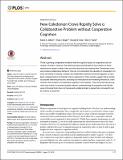Files in this item
New Caledonian crows rapidly solve a collaborative problem without cooperative cognition
Item metadata
| dc.contributor.author | Jelbert, Sarah A. | |
| dc.contributor.author | Singh, Puja Jolly | |
| dc.contributor.author | Gray, Russell D. | |
| dc.contributor.author | Taylor, Alex H. | |
| dc.date.accessioned | 2015-09-10T14:40:01Z | |
| dc.date.available | 2015-09-10T14:40:01Z | |
| dc.date.issued | 2015-08-12 | |
| dc.identifier | 215920981 | |
| dc.identifier | b883c63c-cd66-434a-8958-5870636773ee | |
| dc.identifier | 000359492300013 | |
| dc.identifier | 84942874890 | |
| dc.identifier | 000359492300013 | |
| dc.identifier.citation | Jelbert , S A , Singh , P J , Gray , R D & Taylor , A H 2015 , ' New Caledonian crows rapidly solve a collaborative problem without cooperative cognition ' , PLoS One , vol. 10 , no. 8 , 0133253 . https://doi.org/10.1371/journal.pone.0133253 | en |
| dc.identifier.issn | 1932-6203 | |
| dc.identifier.uri | https://hdl.handle.net/10023/7439 | |
| dc.description | his work was supported by a University of Auckland Doctoral Scholarship (S.A.J.), a University of Auckland Master's Scholarship (P.J.S.), a Research Fellowship (Corpus Christi college, University of Cambridge), Cogito Foundation grant and a Rutherford Discovery Fellowship (A.H.T.), and a grant from the New Zealand Marsden Fund (A.H.T. and R.D.G.). | en |
| dc.description.abstract | There is growing comparative evidence that the cognitive bases of cooperation are not unique to humans. However, the selective pressures that lead to the evolution of these mechanisms remain unclear. Here we show that while tool-making New Caledonian crows can produce collaborative behavior, they do not understand the causality of cooperation nor show sensitivity to inequity. Instead, the collaborative behavior produced appears to have been underpinned by the transfer of prior experience. These results suggest that a number of possible selective pressures, including tool manufacture and mobbing behaviours, have not led to the evolution of cooperative cognition in this species. They show that causal cognition can evolve in a domain specific manner-understanding the properties and flexible uses of physical tools does not necessarily enable animals to grasp that a conspecific can be used as a social tool. | |
| dc.format.extent | 17 | |
| dc.format.extent | 1484921 | |
| dc.language.iso | eng | |
| dc.relation.ispartof | PLoS One | en |
| dc.subject | Orangutans Pongo-pygmaeus | en |
| dc.subject | Corvus-Moneduloides | en |
| dc.subject | Captive elephants | en |
| dc.subject | Inequity aversion | en |
| dc.subject | Saguinus-oedipus | en |
| dc.subject | Capuchin monkeys | en |
| dc.subject | Social-structure | en |
| dc.subject | Hook-tools | en |
| dc.subject | Task | en |
| dc.subject | QL Zoology | en |
| dc.subject | BF Psychology | en |
| dc.subject | DAS | en |
| dc.subject.lcc | QL | en |
| dc.subject.lcc | BF | en |
| dc.title | New Caledonian crows rapidly solve a collaborative problem without cooperative cognition | en |
| dc.type | Journal article | en |
| dc.contributor.institution | University of St Andrews. School of Psychology and Neuroscience | en |
| dc.identifier.doi | https://doi.org/10.1371/journal.pone.0133253 | |
| dc.description.status | Peer reviewed | en |
| dc.identifier.url | http://journals.plos.org/plosone/article?id=10.1371/journal.pone.0133253#sec023 | en |
This item appears in the following Collection(s)
Items in the St Andrews Research Repository are protected by copyright, with all rights reserved, unless otherwise indicated.

